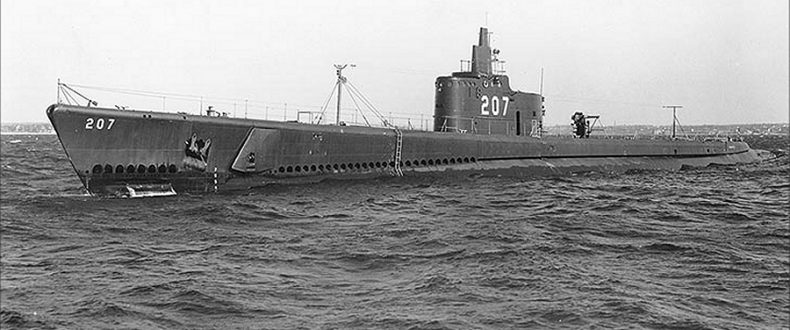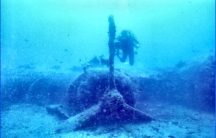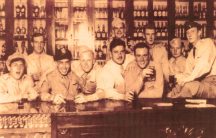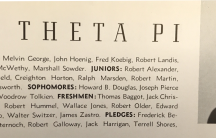Lieutenant Edward P. Haupt and the USS Grampus
The submarine USS Grampus (named for a species of dolphin) was commissioned by the Electric Boat Yard at New London, CT, on May 23. 1941. Few there that day would have guessed that its service in the United States Navy would be of less than two years’ duration and that its crew of 71 men would be lost forever.
A line officer on the Grampus was Lieutenant Edwin Paul Haupt. Although he was born in Los Angeles, he spent much of his boyhood in Tulare, California. As a young man, he worked at the Tagus Fruit Ranch, starting in the horse care department and then working his way up to the personnel and administrative areas.
He also attended UCLA, taking courses in chemistry, music, Spanish, and geology. He was a member of the Phi Kappa Psi fraternity and the a cappella choir as well.
He entered the Navy in 1940, receiving numerous letters of recommendation, including one from US Congressman A.J. Elliott who stated, “I have known Paul since he was a small child and he has shown leadership, possesses a great character…one who has always been willing to shoulder responsibility.”
After receiving training in both PT Boats (for which he was considered qualified for command) and submarines and a final leave at home in November of 1941, in July of 1942 he was ordered to report for duty on the Grampus. Ensign Haupt (later promoted to Lieutenant) was aboard when the Grampus left on its fourth War Patrol in October. This cruise went through the dangerous waters around Guadalcanal. Similarly, its fifth War Patrol was in the same area.
On February 11, 1943, Grampus left Perth, Australia on its sixth, and final War Patrol. About a month later, Grampus failed to respond to radio inquiries and was never seen again. An oil slick was spotted off Kolombangara island around this time, but no one could ever confirm whether it came from the wreckage of Grampus or not.
His sister, Mrs. Evangeline Christiansen of Pasadena received the dreaded telegram on March 22, 1943:
The Navy Department deeply regrets to inform you that your brother, Lieutenant Edward P. Haupt, United States Naval Reserve, is missing in the performance of his duty and in the service of his country. The Department appreciates your great anxiety but details are not now available and delay in receipt thereof must necessarily be expected. To prevent possible aid to our enemies, please do not divulge the name of his ship or station.”
Two years later, his grandfather, Hulett C. Merritt, wrote a letter to the Navy:
“We have never been able to secure any information as to his fate or that of the “GRAMPUS” nor has anyone ever received any of his personal effects…We realize the thousands upon thousands of letters like these you receive from relatives like us who are driven to distraction by no news from their loved ones. I pray you will tell us something if only that no one has the slightest date of what has become of the ‘GRAMPUS.’ Do try to forget the mechanical routine and put yourself in our place and do all you can.”
Three weeks later, the Navy acknowledged the letter, with grim words.
“In view of the length of time that had elapsed and the strong probability that your grandson lost his life while serving aboard the USS GRAMPUS when that submarine was lost in the Pacific area, the Secretary of the Navy directed that his status be changed from that of missing to deceased.”
“The Bureau regrets to advise you that all of your grandson’s personal effects were lost when his ship was reported overdue and presumed to be lost. The Navy Department again extends sympathy to you in your loss.”
A few more letters were exchanged, but in the end, the truth regarding the loss of the Grampus and Lieutenant Edward P. Haupt, would never be known.

























